Fanfiction: An Ally to Queer Fans
Fanfiction itself is a medium that does not restrict nor censor pre-existing works. Indeed, it has been perceived as a disrespect to the original creators or a source of questionable morals. However, it is important to recognize the foundation of fanfiction and its importance to a fandom – especially to the LGBT+ minority. For them, it provides an ease of entering a community and culture that welcomes the different and the unique. Fanfiction being innately participative can be a platform that represents the queer than condemns, and introduces awareness of the dimensions of sexuality that is often inhibited by the mainstream media. This article tackles how fanfiction validates breaking canon media to allow self expression that encourages discovery of one’s sexual identity.
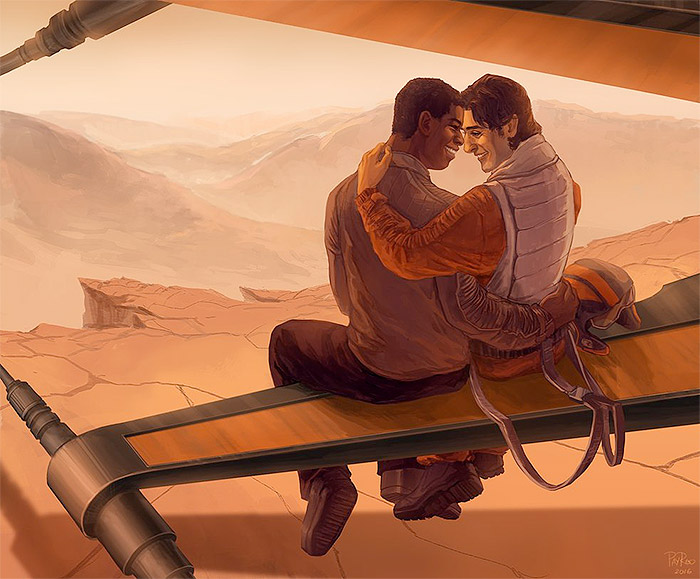
A Response to Canon
According to Koehm 1, “fanfiction as an artform is fundamentally rooted in [the] act of ‘re-vision’” which Rich 2 defines as “the act of looking back, of seeing with fresh eyes, of entering an old text from a new critical direction.”. As a derivative of “the old text” or known in fan culture as canon, fanfiction maintains the elements that are familiar and well-loved with the freedom to present a “new critical direction” by introducing the world, characters, and themes filtered through the interpretation of the fanfiction writer. Canon and fanfiction are both driven by its fandom, but what makes the latter truly effective is its compounded variety. Every fan has the power to “re-vision” canon to their preferences, thus making it personal, and when shared to the fandom, collective.
Every community of fans include a wide variety of people. In a census 3 conducted on the demographic of Archive of our Own (Ao3), a major non-profit fanfiction archive that recently won the Hugo Award for Best Related Work, 53.7% of users surveyed identified belonging to a gender, sexual, or romantic minority. In a different study 4, heterosexuality resulted only as the third percentage after bisexuality and asexuality from its participants of fanfiction readers. While these statistics do not comprehensively depict fandoms, it does illustrate the significant participation of LGBT+ individuals within the space of fanfiction, and by extension, their presence as fans of canon.

This diversity of audiences incited the rise of queer visibility and themes in various works of fiction through the years, such as Cartoon Network’s Steven Universe and Adventure Time that are targeted to younger audiences. Nonetheless, majority of the mainstream media continues to under represent and misrepresent the LGBT+ community. There remains a stigma and prejudice that either constrains these characters into normative packages (“the gay best friend”) or limits their identity to a one-dimensional label (“bury your gays”).
Queerbaiting is one of the complex issues that often negatively derail the connection between canon and its fandom. Fans use this terminology to describe the “pattern of suggestions incorporated” within canon implying a romantic intention between characters that producers never follow through “into fruition” 5. Queerbaiting is less of an institutional practice but a phenomena that fans notice and question. The fandom of the long-running action-fantasy show, Supernatural, did notice the heavily intimate subtext between characters, Dean and Castiel (or Destiel), and even brought the question to the showrunners and cast. It’s the blatant disregard of possible queer characters even after so many seasons, and the objectification of sexualities 6 that broke hard-earned trust by discovering how its creators do not share the same ideals with its fandom 7.
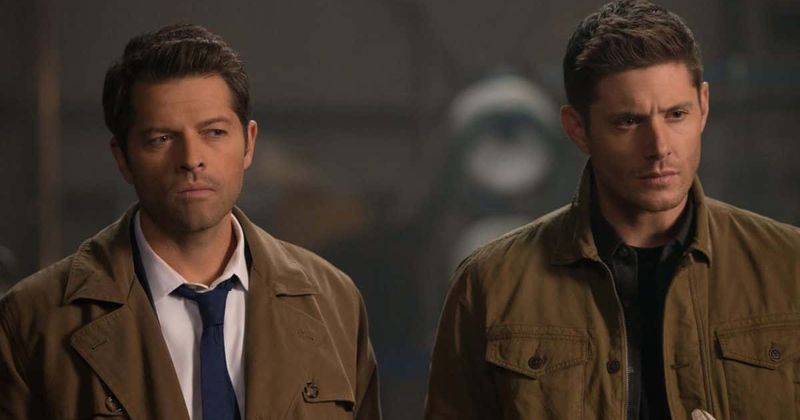
There is a clear invalidation of the existence of queer identities the invites heteronormativity in both fiction and reality. As the world becomes more accepting of diversity, the importance of representation in media deepens. Caravaca 8 states, “visibility equals power, and one could not exist without the other.”. Negating queer identities equates to stripping them of capacity and rights and effectively diminishing their place in society.
Queerbaiting is merely a “symptom” 9 of a bigger problem. This is where fanfiction offers the fandom an aid to alleviate the broken trust towards mainstream media. Koehm 10 attributes the manifestation of slash fics and femslash, a subgenre 11 of fanfiction that features pairings of the same gender (M/M and F/F, respectively), as the fandom’s response to “representation being denied through queerbaiting.”
Fanfiction writers “re-vision” canon characters to supply what has been missed. These slash relationships, however, are not strictly romantic. They are not always about sex. They also explore themes of platonic and filial connections and settings of undisturbed domesticity that provide fanfiction readers with fresh perspectives on the characters and a different level of entertainment. As slash and femslash fics are character-centric in narrative, fanfiction writers imbue themselves and their experiences into the openly queer context it provides. Fanfiction serves as an extension of their identity, granting LGBT+ fans the visibility, the power, and the appropriate treatment they deserve.
A Playground to Imagine
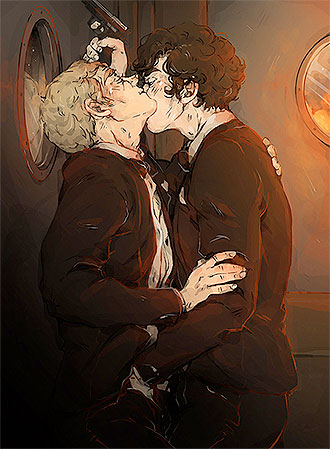
But why stop there? Fanfiction writers are as much creators as published authors, and it is an artform that developed and flourished overtime. There are multiple websites that host fanfiction works, whether exclusively (Ao3, fanfiction.net and the like) or inclusively (Tumblr, social networking sites, etc.). An increasing number of fandoms entails a doubling amount of fanfiction; however, without queerbaiting by canon, what else do these works contain?
In its integration of freedom and creativity, Mixer 12describes fanfiction as a “psychosocial moratorium” that acts as “essential to adolescent identity development” through “[falling] in and out of love with people and ideas” without the consequences of adulthood and social norms. As a “psychosocial moratorium”, fanfiction becomes a playground that bends to no authority but imagination. Canon becomes the gateway but not the keeper.
Slash and femslash fics evolve into tropes that test gender normativity, tap into the nuances of alternate universes, and try out the possibilities within the taboo. This “re-vision” widens the scope of fanfiction towards themes and topics that are censored such as sex and sexuality, and arcs that are seemingly monotonous in narrative such as the practicalities of a relationship. Fanfiction writers and readers are exposed to “wide ranges of genders and sexualities”, restricted and erased by the mainstream, that offers them the opportunity to “learn about themselves in an equally wide range of ways” 13. Cristina Orlando 14, a 31-year-old nonbinary writer from New York, shares how it was fanfiction that introduced them to the “mechanics of queer sex” and understanding themself. Of course, fanfiction is not the perfect source of sexual education but for unsure LGBT+ adolescents, it confirms the existence and validity of queer identities and sexuality that mainstream erases.

Mixer 15concludes, in a qualitative study, the correlation of fanfiction and the sexual growth and development of its readers. She cites how “the freedom given to participants of reading or writing any gender identity, sexual orientation, or sexual act that they wish, without worrying about the real-world consequences of such actions, is a powerful draw.”. Participants who found their identities represented showed more interest and willingness in learning through fanfiction, “whether in regard to sexual acts or scripts.”. Fanfiction creates an avenue that is educational to the fandom in its introspection of individual identity – sexual or otherwise – and its relation to canon society with its own restrictive norms, that is as much a reflection of the real world.
As a “psychosocial moratorium”, fanfiction grants queer visibility that allows for identity formation. This is made possible through a fandom that utilizes its participatory culture 16, especially where “members […] feel some degree of social connection with one another (at the least, they care what other people think about what they have created)” 17. Fanfiction, a limitless and imaginative translation of canon, becomes a bridge that collects and connects global fans, especially the LGBT+ minority, through the accessibility of technology. Mainstream media has a distinct separation between producers and consumers, but fanfiction is created by fans for the enjoyment of fans with respect to personal preferences. This bridge enables queer fans to identify with other members of the community, in identity and creative perspectives.
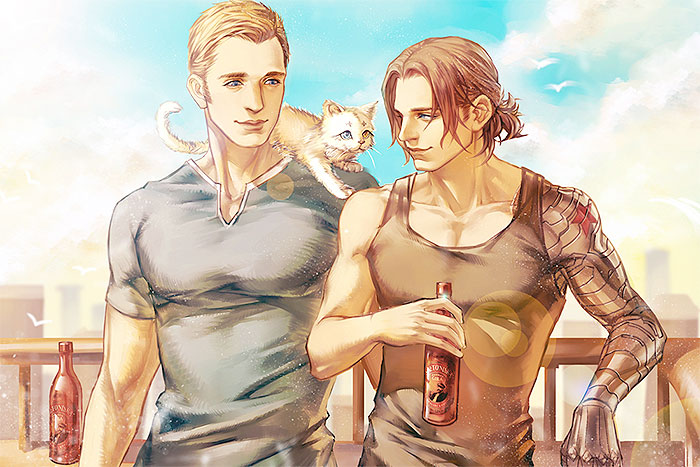
A Critic of Media
Given that fanfiction is a cycle of fandom participation, how does it affect mainstream media, if at all? It is good to be reminded that the gap between producer and consumer may not be as deep of a chasm as initially presented.
Fanfiction benefits with the reader-response criticism 18, a school of criticism that began in the 1970’s, that focuses on how the consumer (reader) accompanies the producer (author) in adding meaning to canon (text). Canon is not treated as a “self-contained [entity]” which coincides with the fundamental act of reconstruction and the freedom of imagination that defines fanfiction. The fandom and its fanfiction writers have their own creative rights over canon as “a text can exist only as activated by the mind of the reader”. Therefore, fans’ interpretation of canon matters. Fanfiction then becomes “a form of literary criticism” that acts “as a secondary work of fiction derived from and built on the primary one.”. 19 The transformation invoked by fanfiction writers is a testament to the impact and quality of canon.
As a criticism, fanfiction highlights what canon is lacking, may that be a well-fitting ending or respect and visibility for the LGBT+ community. Its plethora showcases how “the absence of choice remains the great unacknowledged reality” 20 within conservative mainstream media for queer and other minorities.
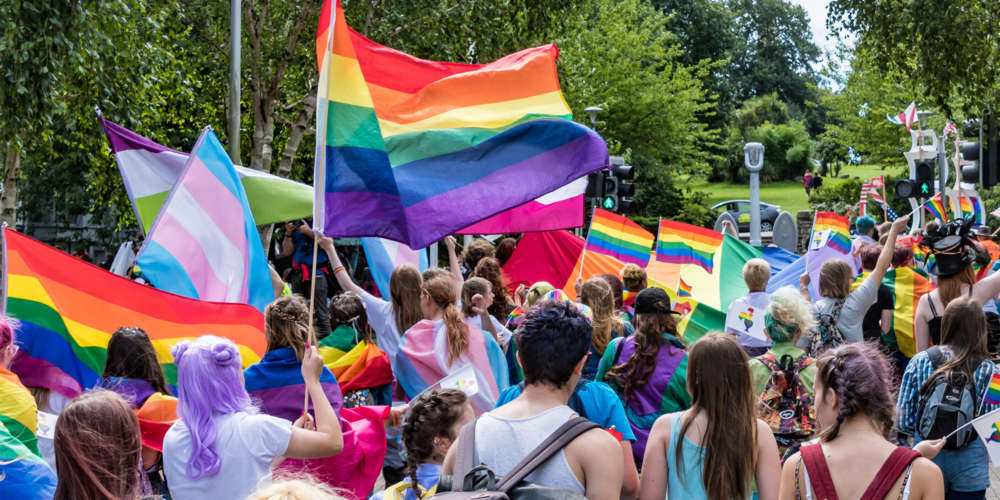
Fanfiction brings the presence of choice for all members of the fandom. There is an option for the LGBT+ community to rightfully represent themselves; there is an opportunity to discover the important dimensions of sexuality and identity. There is a choice to push, question, and criticize mainstream media for both its growth and shortcomings.
The collective behind fanfictions – the fandom and its writers – are people living today, experiencing today. Within them is an assortment of stories and identities that have the choice to leap and create their own canon, “[bringing] the sensibilities of fanfiction to the mainstream” 21. Neil Gaiman, author of Stardust, Coraline, Good Omens, and more, has his own history in fanfiction, understands its presence in the fandom 22, and even won a Hugo Award for his Sherlock Holmes/H.P. Lovecraft fanfiction 23. Fanfiction is not a rite of passage to enter mainstream media, but it is a path worth exploring.
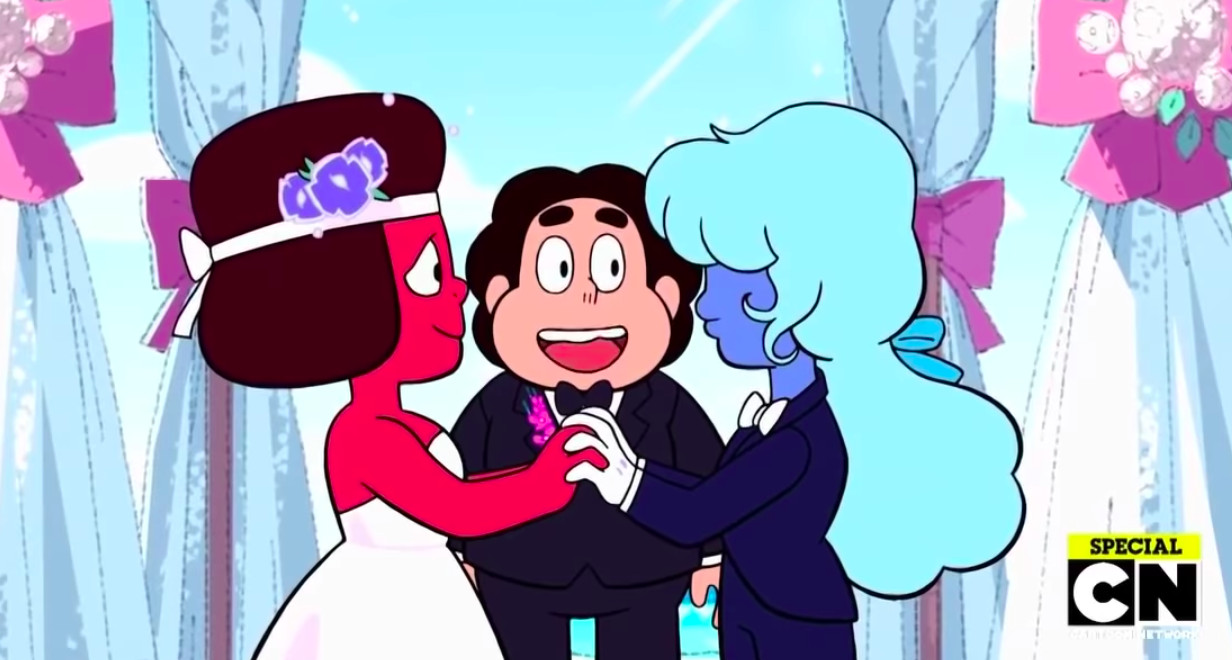
After all, the growing diversity of fictional entertainment overtime resulted from mass reimagination of media “until the media itself delivered” 24. Rebecca Sugar 25, the nonbinary creator of the openly queer animated show, Steven Universe, shares her determination in releasing the first same-sex wedding in a cartoon for children. She notes the importance of creating a “space for gender-expansive kids” especially in the mainstream, remembering her own childhood frustration of having interests that were not considered “for her”. This goes to show that to affect the mainstream is not as impossible. At this time of accessibility, fanfiction is a tool of constructive criticism, wielded by the fandom, that can transform popular media according to the receptivity of its generation.
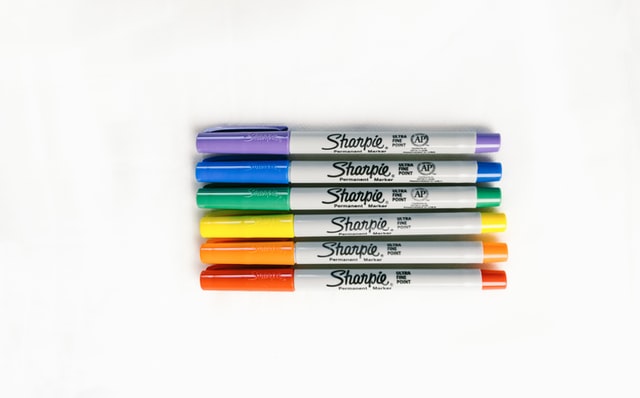
Fanfiction is known for many reasons. It is a reconstruction of canon that for some is a sign of disrespect to the creator. It is a playground without consequences that for some is a cause for the problematic. After all, fanfiction remains a public platform that, while without set rules, requires responsibility from writers and readers. For the LGBT+ fans, however, fanfiction can become a friend in alienation, answers to curiosity, and hopefully, eventually, open the door to redefining mainstream media.
Works Cited
- Koehm, D. (2018). Revision as Resistance: Fanfiction as an Empowering Community for Female and Queer Fans (Undergraduate). University of Connecticut. ↩
- Rich, A. (1972). When We Dead Awaken: Writing as Re-Vision. College English, 34(1), 18-30. doi:10.2307/375215 ↩
- Gender, Sexual or Romantic Minority. (2013). Retrieved from https://centrumlumina.tumblr.com/post/62890602051/gender-sexual-or-romantic-minority ↩
- Mixer, L. (2018). “AND THEN THEY BONED”: AN ANALYSIS OF FANFICTION AND ITS INFLUENCE ON SEXUAL DEVELOPMENT (Undergraduate). Humboldt State University.
↩ - Koehm, D. (2018). Revision as Resistance: Fanfiction as an Empowering Community for Female and Queer Fans (Undergraduate). University of Connecticut. ↩
- Gennis, S. (2014). Supernatural Has a Queerbaiting Problem That Needs to Stop. Retrieved from https://www.tvguide.com/news/supernatural-queerbaiting-destiel-1089286/ ↩
- Campbell, A. (2016). Queerbaited: Homoeroticism & Homophobia in Supernatural in the Age of the Internet. Retrieved from https://medium.com/@queensnknaves/queerbaited-homoeroticism-homophobia-in-supernatural-in-the-age-of-the-internet-e8b80ffb0b4b ↩
- Caravaca, I. (2017). Queerbaiting: The Unfulfilled Promise of Queer Representation. Universidad de Cadiz. ↩
- Campbell, A. (2016). Queerbaited: Homoeroticism & Homophobia in Supernatural in the Age of the Internet. Retrieved from https://medium.com/@queensnknaves/queerbaited-homoeroticism-homophobia-in-supernatural-in-the-age-of-the-internet-e8b80ffb0b4b ↩
- Koehm, D. (2018). Revision as Resistance: Fanfiction as an Empowering Community for Female and Queer Fans (Undergraduate). University of Connecticut. ↩
- Romano, A. (2016). Canon, fanon, shipping and more: a glossary of the tricky terminology that makes up fandom. Retrieved from https://www.vox.com/2016/6/7/11858680/fandom-glossary-fanfiction-explained ↩
- Mixer, L. (2018). “AND THEN THEY BONED”: AN ANALYSIS OF FANFICTION AND ITS INFLUENCE ON SEXUAL DEVELOPMENT (Undergraduate). Humboldt State University. ↩
- Mixer, L. (2018). “AND THEN THEY BONED”: AN ANALYSIS OF FANFICTION AND ITS INFLUENCE ON SEXUAL DEVELOPMENT (Undergraduate). Humboldt State University.
↩ - Strapagiel, L. (2019). Smutty Fanfiction Taught Me More About Queer Sex Than School Ever Could. Retrieved from https://www.buzzfeednews.com/article/laurenstrapagiel/fan-faction-queer-sex-education
↩ - Mixer, L. (2018). “AND THEN THEY BONED”: AN ANALYSIS OF FANFICTION AND ITS INFLUENCE ON SEXUAL DEVELOPMENT (Undergraduate). Humboldt State University. ↩
- Fandom and Participatory Culture – Subcultures and Sociology. Retrieved from https://haenfler.sites.grinnell.edu/subcultural-theory-and-theorists/fandom-and-participatory-culture/ ↩
- Jenkins, H. (2009). Confronting the Challenges of Participatory Culture: Media Education for the 21st Century (p. 6). Cambridge, Massachusettss: The MIT Press.
↩ - Delahoyde, M. Reader-Response Criticism. Retrieved from https://public.wsu.edu/~delahoyd/reader.crit.html ↩
- Vink, R. Fan Fiction as Criticism [Ebook]. Retrieved from https://www.academia.edu/11613702/Fan_Fiction_as_Criticism ↩
- Rich, A. (1980). Compulsory Heterosexuality and Lesbian Existence. Signs, 5(4), 631-660. Retrieved April 29, 2020, from www.jstor.org/stable/3173834 ↩
- McAlpine, M. (2017). Fanfiction is Always Media Criticism. Retrieved from https://medium.com/@marykatemcalpine/fanfiction-is-always-media-criticism-d34f0c3f64f6 ↩
- Gaiman, N. (2012). [FAQs]. Retrieved from http://journal.neilgaiman.com/2002/02/they-just-changed-servers-for-faq-line.asp
↩ - Gaiman, N. [@neilhimself]. (2017, November 30). I won the Hugo Award for a piece of Sherlock Holmes/H. P. Lovecraft fanfiction, so I’m in favour. [Tweet]. Retrieved from https://twitter.com/i/status/936054432181125120 ↩
- McAlpine, M. (2017). Fanfiction is Always Media Criticism. Retrieved from https://medium.com/@marykatemcalpine/fanfiction-is-always-media-criticism-d34f0c3f64f6 ↩
- Mey, R. (2018). How This Nonbinary Woman Created the Queerest Cartoon on Television. Retrieved from https://www.them.us/story/rebecca-sugar-steven-universe-interview ↩
What do you think? Leave a comment.











I have exactly two qualifications for fanfic. The prose is good and the characters are feasible.
Thanks for this piece. I’m agender and asexual so one of my favorite things about some parts of fanfiction is that there are more nonbinary characters included and asexual people who aren’t ‘magically fixed’ in the story. It’s incredibly difficult to find representation in media(does anyone know any good books about nonbinary characters), so fanfiction, where random people can change characters so that they connect with them more, is a bit of a safe haven.
Honestly I’ve read better written fanfic then I have actually books. That says something.
I got a fanfiction net account in high school in 2012, and I loved it because I could put the stories I had in my head somewhere that I could share it. The issue was that the Sonic section was/is dominated by romance and one particular ship I didn’t really care for, and I wasn’t that into writing more adventure-y stories Also I didn’t want to write something and put my time into something I wasn’t interested in just to catch people’s attention. I also don’t know how to write romance that well, and I know I don’t know how so I didn’t because I didn’t want to embarrass myself, and it just be there, forever. I like certain gay ships, but more of them are actually lesbian ships than ones with the guys in it.
I like them when the two people actually like or don’t dislike or hate each other, because it just feels wrong to me to change that into something the complete opposite as something you’re really serious about and not just joking around.
Shipping is very stressful when you care too much, and then there’s fights in between ships over who Sonic should do it with. I found that stepping away and getting yourself to not care as much really helps and increases the fun and value of escapism when you’re more relaxed. 🙂 And also there seems to be less fighting among the gay ships than the straight ships which is good.
I read/write it purely because I like the two characters dynamics… I don’t care if there m/m or m/f or f/f. What I do care is that I cant even state or say I write m/m because everyone instantly jumps the gun that I’m fetishizing gay relationships…Getting called Fujoshi, etc. Like…I can tell reality from fantasy, I don’t project it to IRL gay men? I’m not even that attracted to men (I’m bisexual). Also even I dont know why I like it, the main ship I write about I’m not even attracted to the characters. I see them as my kids, but I love there relationship if that makes sense? They both support and improve one another (in the canon) I dont harrass the creator or anyone. I just kinda hate that everything in fanfic (or general) is suppose to be a big ethical, moral, privileged view of someone. When sometimes PEOPLE JUST LIKE STUFF.
I agree. I write fanfic myself often and it’s usually to further explore the dynamic between two characters that I love. And I consider them as my kids too 🙂 Much like you, I’ve also experienced gatekeeping in fiction (especially with m/m) which just feels counterproductive to the point of fiction in the first place.
My LA teacher (who is only 23) always asks what my friends and I are talking about. We say books, and she always gets interested and asks what book. And then we will most likely name a fanfic or something, and she always says ew, or “those aren’t books!” Once she said that we had to stop talking about that in her classroom.
Fanfiction definitely still holds a lot of stigma to people who are less involved in fan culture. Often, I also have to omit telling my friends that I read/write fanfiction because they would only judge. But if fanfiction is important to you, then it should stay important. They may not be published books but they are still are stories. 🙂
I hope you and your friends still enjoy fanfics!
Bad things about writing fanfic. It becomes a warm, safe space, and some writers I know never venture out of it. That’s okay if all you want to do is fanfic, but, if your ambitions are to go professional, that’s a bad thing.
I agree that writing fanfiction have different parameters from working with original content but I think the warm, safe space can become a sounding board for writers who want to be professional. There are good aspects that can carry over from writing fanfiction, like character development and stylistic techniques. Of course, it really boils down to how the critical the writer intends to be with their work, may it be fanfiction or original.
This. Fanfic, for the most part, isn’t as structured, long, or plot-driven as most commerical fiction. Fanfic writers are essentially writing dramatic opera pieces which aren’t really the tone or pace of commercial fiction. You have to learn the difference if you want to succeed beyond fanfic.
If you decide to turn your fan piece into your own universe/work, readers and editors may very well recognize the source and will not be happy.
Also, you don’t want to learn how to copy someone else’s style. You want to develop your own style and voice which means you will spend about a million words getting everyone else out of your head and into your own so you comes through.
“Also, you don’t want to learn how to copy someone else’s style.”
English teachers still assign imitation as a tool to teach rhetoric. It helps young writers gain control over how they sound, which is the first step in developing their own voices.
Fiction and nonfiction are different in that sense, although anyone who wants to write nonfiction professionally needs to figure out their own styles. (You need different ones for different types of nonfiction.) Fiction is all about individual voice/style. I’ve taught fiction craft for many years, but, beyond mentioning that a writer’s natural voice comes after a lot of writing where the sheer exhaustion from trying to imitate others finally allows the natural voice/style to come through, I don’t teach voice/style because it shouldn’t be taught. I do recommend that the writer read extensively in their specific genre, and the authors they pay attention to be newer, more successful authors. Narrative styles change over time, and recent years have seen lots of changes. If the writer immerses herself in enough newer fiction of her genre, she will find that her voice will reflect that.
Right in some regards, so wrong, wrong, wrong in others. As a fairly established fanfic writer specializing in diminutive colorful equine literature (ahem), I found that it expanded my writing scope to places I never would have gone if I had just stuck with dragons and sorcerers. I’ve written crossovers with a Bolo, Harry Potter, epic level destruction and the simple pleasures of drifting down a lazy river on a raft, of love between characters who belong together, and characters who really need restraining orders against them. I’ve raised gales of laughter, gallons of tears, and friendship with authors I never would have met in a million years if not for this hobby. And if I ever get back to dragons and sorcerers, they are going to be far more epic than ever before.
What works for you, works for you. Writing is very individual.
Lovely post. I have written fanfic since I was a teenager – starting up again 15 years later into adulthood. It’s been a fun way to try out different writing styles, develop more sophistication over time, and figure out what kind of stories I do like and why. (Example: I’ve never written it, but John Reese whump for Person of Interest remains deeply satisfying reading to me for some reason, and there are some really great writers in that fandom.) It also gives my brain a creative outlet since my day job doesn’t let me have that. Of all the nerdy hobbies it seems to get an especially bad rap, but I appreciate it for all the reasons you mentioned you in article.
Really cool article. I’ve dabbled in fanfic over my life as I tried to create my own voice.
A great discussion that identifies a really important component of the role of fanfic in normalising diverse perspectives, indeed it is a great way to truly represent the wider world rather than the narrow, perpetually reinforced standards of “mainstream” (although that term needs a review as it no longer matches the mainstream audience or the demographic that views it) entertainment.
Thanks for sharing.
Cool article! I used to dislike fanfiction because I felt like it was disrespectful to canon, and because I felt like the authors were using it as a substitute for original ideas. Then though, I started reading Harry Potter and similar series (uh, long story), and I realized some things about representation.
Namely, I’m a straight, cis female, so I can’t speak to queerness. But I do have a disability, and I noticed how often disabled characters got the shaft, especially in certain types of fiction like fantasy and sci-fi (because apparently, technology and magic mean diverse ability levels cannot realistically exist, which is crap). I started writing my own fanfiction to handle these feelings, and it was cathartic. I’m now much more open to it, and glad we have fanfiction as a medium for our communities. Getting a book traditionally published is incredibly difficult, but the fanfiction community (ies) lets people express themselves in real time, without the endless red tape.
I’m glad you found catharsis in fanfiction, as do I. Through it, I was actually also able to discover and educate myself more about disabilities, its nuances, and its realism. 🙂 And it really is absolute crap that disability representation is somehow mutually exclusive with fiction.
Fanfiction can also be a useful jump point for your own brand of fiction. Twice I’ve adapted ideas I wrote for another universe for other stories. One was based on a scene in How To Train Your Dragon, where I realized Hiccup should have been toasted by the Nightmare in the background — what would happen to Astrid’s life / relationship to other kids / affections for Hiccup / relationship with Toothless if Hiccup disappeared right there? That Astrid became the basis for a character loosely inspired by a historical figure with few known details of her life. Another time I had a waking dream of sorts about how a long-running graphic novel series might end, and started writing a synopsis. After reaching 5200 words of plot ideas (not written story, just ideas!) I decided to change the setting and use that outlandish plot for my own purposes. It now bears no resemblance to the original, and will probably include a LOT more time travel than the inspiration wanted to mess with.
Good point! Well done gaining inspiration and developing your ideas! They sound interesting. Best of luck! 🙂
I love fanfiction, but just stay away from Mary Sue stuff, and no more than than one crossover at a time, and for the love of god people, label your OC centric fics as being OC centric. Jesus, that last one. I don’t know why OC centric fanficcers are so adamant in refusing to label as such. It makes it so much easier to filter them out when they do it.
I’ve been enjoying writing my fanfic. I can see, even in just a few chapters, how my writing has significantly improved. I’ve learned a lot writing fanfic.
I once read a fan fiction where the Joestar’s and their descendants were all living together and they were all in love with the main character which was supposed to be you and I still don’t understand the dynamic of how this would work because if I were to chose one I would have been either somebody’s grandma, somebody’s grandkid, or both at the same time. And since they all were supposed to be in love with me it would have been this weird incest situation. There was also this alpha beta omega thing going on and I still don’t really understand it and it was kind of scary. Oh and I was Dio’s scullery made or something but I dont know he’s a bad guy in the story and he’s in love with me to?? It still haunts and confuses me.
I’ll be honest I’m a straight guy and I love fanfiction (all of it tbH) but this kinda feels like saying that we shouldn’t be able to enjoy and write these things.
Oh, not at all. In fact, I’m hoping to say that everybody is free to enjoy and write fanfiction. I merely specified a minority because of the common social issues but fanfiction is definitely a platform for anyone. After all, it’s one of its unique and welcoming characteristics. 🙂 I hope you keep loving fanfiction!
Women don’t get as much attention as male characters do. Especially when it comes to the intensity of the relationship. It’s very rare to see female characters have a rivalry that is as intense and complex (that does not involve a boy). Female characters don’t talk to each other, barely know about each other’s existence or are competing for the same man.
As a gay trans man, i can’t help but to nod in affirmation about the fact my ass would’ve never found out about what gay is without… weird doofenshmirtz x perry fanfic and art and finding it as a 9 year old doofenshmirtz stan. 😭
Kudos to that doofenshmirtz x perry fanfic 😂
It has a lot to do with how the media portrays women and just how often. In popular fandoms with one or two top gay ships, you’ll find that women aren’t main characters, nor are they really fleshed out as characters. A lot of the time, they’re just to move the plot along a bit then eventually end up with one of the male main characters in a relationship that won’t be focused on nearly half as much as the relationship between the two male mains. This is also why you’ll see more gay ships than lesbian ships. The main characters are men and the relationships between female characters aren’t focused on. In shows with well developed female mains like Killing Eve, you’ll see more lesbian ships because the relationship between women is actually focused on.
I agree. Fanfiction still derives from the set characters that media provides and more often than not, it lacks women and their agency as people. It’s definitely an issue that needs to be addressed. Killing Eve is a wonderful exception and example of great media.
I often (as a woman who likes women) don’t like f/f fanfiction because the writing has a habit of either being overly sexual without any realistic relationship/character development or they have both women being nearly the exact same in body and mind appearing to be clones with simply different hair and eyes. This puts me out the story. Also how the f do the people have five arms and ten hands??
I can’t deny that even in fanfiction it takes a lot more scouring tags and fandoms to discover f/f fanfics that tell their story well and respect their characters. Maybe with a particular f/f specific fandom, you can find a worthy f/f fanfic or maybe you can try your hand at writing 🙂
Honestly fanfic is just an easy way to get writing inspiration. You already have characters and a premise and you can go wild with something that is purely for your own enjoyment, some people write fanfic without ever publishing it online. It’s just fun.
I just want gay stories that aren’t all about homophobia. Stories about being gay (also pan, Bi and other sexualities) and the struggles that come with it need to exist, but I don’t want all gay representation to revolve around being gay. There is a lack of casual representation in gay media, where gay relationships/experiences are treated the same as straight ones. (I also believe this is true for other minority groups as well, such as disabled people, people of colour and transgender/non binary people. )
I’d like to share my perspective as a bi woman who reads m/w, w/w, and m/m.
Gonna be honest, I read and write romantic fanfiction simply based on who’d make kind of a cute couple. Man, woman, nonbinary person, I don’t care. If I like the dynamic, I’ll probably read/write ship fic about it regardless of gender. Usually I only read or write w/m fanfic because it wasn’t fulfilled in the canon series. This leads to me not reading/writing much w/m because those kind of relationships are usually fulfilled in canon. It’s the m/m and f/f relationships that are hardly fulfilled in canon, so I read more of that. But, looking at my fanfiction habits, I still find myself writing a disproportionate amount of m/m fanfics compared to f/f fanfics. After thinking about it for a bit, I feel like that can mostly be explained (in my case, at least) by the lack of women in main roles in the shows I watch, books I read, etc (shows like Stargate). Sometimes there literally aren’t 2 women to ship, which is irritating. Me being me, I mostly write w/m and m/m fluff and not try to force something f/f just because it’s f/f.
I read yaoi fanfiction because I find the male characters in games/anime more interesting than the female characters. The female characters, admittedly, tend to be either eye-candy, annoying and/or weak or just bitches. That’s not to say that there aren’t exceptions to that rule. Bayonetta is eye-candy but she’s also a badass. The male characters tend to have all kinds of depth to them to the point I enjoy them more. Even enough to get attached to their personalities. And sometimes you get characters that are close as friends, but you can see yourself enjoy seeing them as a couple too.
I found myself drawn to gay fanfiction growing up. Not realising why i was more connected than straight ones…. Ends up im a lesbian and just have less likable girl characters in media to make ff out of. Then tend to flesh out guys more in media and more likable. Until more recently of course.
I’m reminded of something I learned in an Anthropology & Art class, many yrs ago. Across societies, there’s often a value attached to doing the thing that is hard. If the medium is naturally smooth, great artists will achieve a rough surface; if it’s naturally rough, they will work to accomplish a smooth surface.
My whole life is about harry/any other Male character.
Hey and thanks for writing this! I’m very happy to see fanfiction explored this way. One thing that stood out to me, though, re: representation, is that all (fan)fictional couples represented here are m/m. The only f/f couple (and let me say that I’m super stoked that there is one) is a canon one – and while that’s great, fanfic w/w (and fanart!) exists and is just as excellent! I’m part of the Bering and Wells fandom, for example, and the amount of talent that people pour into their art here is staggering. Check the Bering and Wells tag on Tumblr for examples, and AO3 for incredibly amazing stories. I know it’s nowhere near as big as Sherlock/Watson or Kirk/Spock, but we’re there. Wonder Woman has also kicked off a big wave of f/f art. Even within Star Trek there is a lot of f/f going on – Janeway/Seven, for example!
Thank you for this article – really enjoyed it!
I think that reading a lot of fanfiction has also made me a better reader. There’s nothing like reading a hundred different interpretations / interpolations / variants on a text to drive home what is important about that text, and how it interacts with me as a reader.
Nowadays, there actually is so much straight fanfiction, but that’s because they ship the boys with themselves (y/n) lol
I like fanfiction. But like 99.9% of fanfiction I have tried to read has either had horrible spelling, grammer and writing, Been completely cringy or more often than not, a dump truck load of both.
But at the same time there has been a few I have enjoyed a lot. For example I have read a few fanfictions which are a sorta retellings of the story while giving the characters a more realistic reaction to whats happening to them, something I really like because one thing I have always been annoyed about is how many authors gloss over the mental/physical effect that tragic and difficult events can have on their characters, solely for the sake of story progression.
You know what I’ve never understood, the Harry and Draco fanfictions, like Draco is the guy that does everything possible to make Harry’s life miserable, in a relationship that’s abuse.
One problem I’ve noticed with a number of fanfic writers, especially for TV / movie / comic fandoms, is that all they read is other fanfic. Fanfic becomes very insular and the problems introduced compound, turning the fandom into a giant mess of bad writing. I guess it’s a bit like having a limited gene pool increasing the occurrences of recessive mutations until they reach damaging levels. I wish there would be more “reading a great deal” outside of their comfort zones.
When it comes to gay fanfiction, as a gay male, I gravitated towards it because it was hard to find people who made me feel represented and not pandered too. Even when I fit every stereotype of the effeminate twink, that is palatable to most main stream media. However, as I read more and more fanfiction I slowly realized that I wasn’t that stereotype, I didn’t fit into it.
Furthermore, Gay relationships in mainstream media are rarely depicted in a complex light. Either they are depicted as being a pair and never doing anything without each other, and are written as if they are one character with two different bodies. Or they are written so every issue they have in their relationship is usually just related to their sexuality, or the fact that one of them cheated, or that they are having to deal with homophobia and it’s causing disruptions in their relationship. While all of these are well and good, when every episode that has them in it has one of those elements, you slowly realize that the writers don’t know how to write queer characters. They don’t realize that their is more to them than just their sexuality. There rarely is discourse about a decision one of them made relating to their children, or that one of them spends too much money. It’s just not developed.
And while fanfiction is definitely not consistent in quality, their is enough well written works that show complex relationships between two characters.
I remember used to be scared or at least uncomfortable to watch w/w type of romance because I thought it was a male dominated gender in the same way m/m was.
I thought it was highly sexual like m/m.
When I decided to watch “Sasameki no koto” because there was a beautiful quote I sill love dearly, there was a female character that said she was into GL (girls love) because of how femenine the gender is, and how delicate and mainly focused on the purity of romance and love was.
I was so THROWN off by that statement, I was like REALLY!?
but the very same anime I was watching showed me with actions how delicate it was with the w/w romance.
So I started watching that sort of thing, and I was surprised of how delicate it is, they build up the relationship with the girls before anything can happen, sometimes it can be so damn long 20, episodes for a kiss?
I was SO used to guys having sex within their first encounter that I didn’t know how to react to it.
I even remember this parody of a GL manga I love, it was the very same characters but in a reverse gender world, since both were guys now the first day they met they had sex while in the original work it was not until the end that something happened with them.
There might be an element of truth in this. It’s my understanding that, as a general rule, men are more likely to be interested in sex for its own sake, whereas women are more likely to seek out sex in the context of an involved relationship. So, men who were attracted to each other probably would have sex earlier on in their relationship than women would.
A few years back, I was introduced to fanfiction by a fellow medic, who had written many great pieces himself too. Have to admit that I had never heard about it all till then. Perhaps, fanfiction could do with more commercial mainstream recognition worldwide.
I notice that when a lot of people talk about identities in fanfiction, they seem to be speaking almost exclusively about amateur fanfiction. But, some published works arguably qualify as “fanfiction” too (e.g., Neil Gaiman’s “A Study in Emerald,” Tom Stoppard’s “Rosencrantz and Guildenstern are Dead”…), and some of those probably have queer themes too. I’m surprised people don’t talk more about those.
I was never drawn to reading fanfiction myself; I was never against it either. However, I’m vaguely aware that fanfiction tends to garner a lot of pejorative comments from the reading/writing community.
It seems to me that these comments stem from a sense of elitism that aspiring novelists (those who craft their own “original” stories) hold against fanfiction writers who engage in the act of “re-vision” of established works. But at the end of the day, it’s still writing, isn’t it? To me, writing should never be an exclusive activity that can only be enjoyed by a small elite group.
Thus, this is an absolutely fantastic article defending the value, meaning and sense of community that fanfiction hold for people, especially those belonging to the LGBT+ community. Maybe I’ll go read fanfiction now!
I agree with your perspective on writing! The process may be done individually but to truly appreciate it is a shared experience. 🙂
Thank you for reading! I hope you find fanfiction to your liking and enjoyment!
Wonderful analysis! As a LGBT person, I didn’t realize how much I relied on fanfiction for queer pairings that I couldn’t find in canon. Great work!
Is it bad that I never really got the idea that Supernatural was “queerbaiting”?
Like there are a couple moments that I could definitely see that being the case but I feel like it’s blown a lot out of proportion.
I’m basically the galactus of fan fiction. I don’t publish, but when I’m really into something I bite the whole arm.
Good article! As someone who reads potentially way too much fanfiction, I commonly see representation in fanfiction that is missing from the vast majority of mainstream works.
Fanfiction is a way to experiment with one’s own identity, I write for a rather niche ship that actually helped me figure out my gender identity and my interest in drag.
Excellent article about fanfiction and how queer writers can use it as a medium for creative expression. I especially enjoyed the last section about fanfiction’s relationship with mainstream media, and would like to learn more.
I stumbled upon your article while looking up sources about femslash fanfiction for a semester paper and I’m glad that I did. I am an avid fanfiction reader and almost all of your points resonated with my experience.
As an avid fanfiction reader and writer, I believe fanfiction is almost a necessity. Especially if what is cannon has not made the audience happy. Therefore many people rely on fanfiction for the happiness they didn’t receive in the show, book, movie, etc.